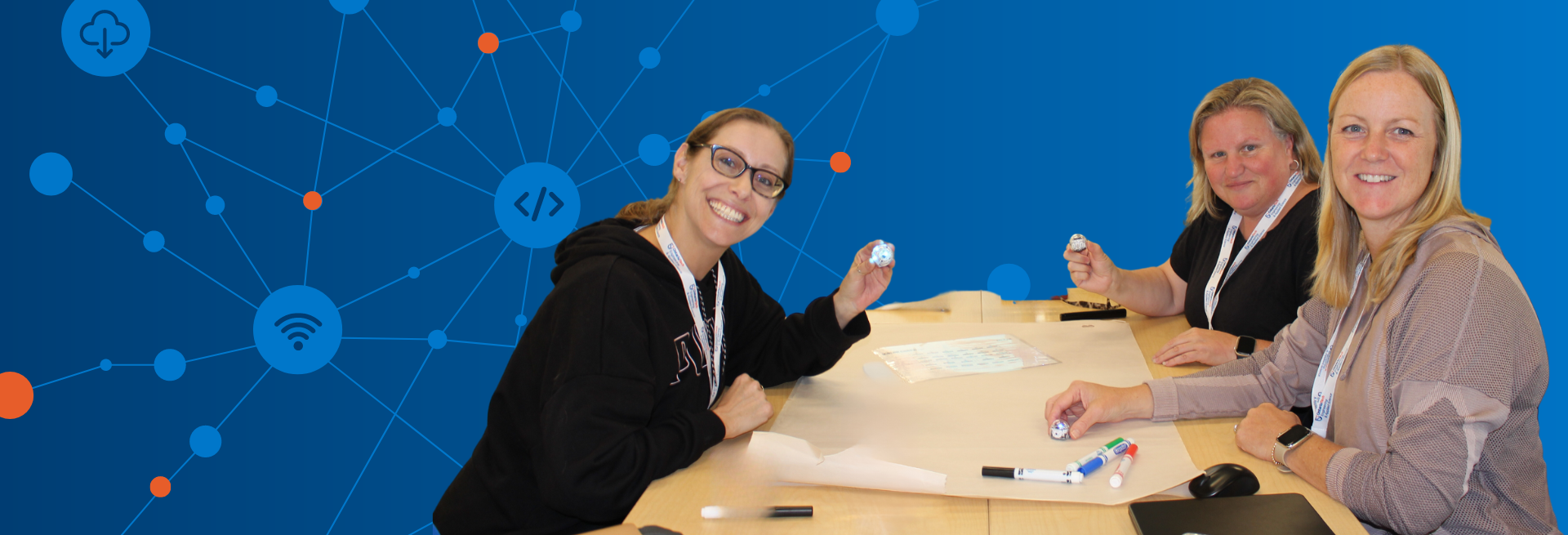TechUcation Conference

TechUcation Conference: Empowering Educators with Tomorrow's Tech Tools
New Date Coming Soon!
CLICK HERE TO BE THE FIRST TO KNOW ABOUT THE NEXT TECHUCATION
This engaging conference will delve into the integration of current education practices with emerging technologies, focusing on utilizing existing tools to meet new curriculum standards and making tasks more efficient. Participants can choose two hands-on workshops led by our Engineering Outreach Coordinators to gain practical strategies for classroom implementation.
The event also features opportunities to interact with vendors and explore a variety of educational tools, enhancing your understanding of technology in education and how it can address teaching challenges. Join us to connect with peers and stay updated on the latest in educational tech.
Schedule
| Location: Ontario Tech University, Oshawa Ontario | |
| Time | Activity |
| 10 - 10:30 a.m. | Opening Ceremonies |
| 10:30 a.m. - noon |
Workshop Session #1 Choose from our curated workshops on integrating technology and education. Coming soon! |
| noon - 1 p.m. | Lunch + Tech Explore |
| 1 - 2:30 p.m. |
Workshop Session #2 Choose from our curated workshops on integrating technology and education. Coming soon! |
| 2:30 - 3:15 p.m. | Resource Sharing + Closing Ceremonies |
F.A.Q.
-
What is TechUcation?
TechUcation is a technology and education conference for educators K to 12 to discuss, discover, and learn about different technologies and how to integrate them into classrooms and learning environments. Hosted by Ontario Tech Engineering Outreach, hear from educators and get valuable practical, hands-on time with familiar or new technologies.
-
Who can attend?
TechUcation is aimed towards educators in Kindergarten to Grade 12 spaces, and primarily Ontario based-educators as much of our content aligns with the Provincial curriculum. The conference is open to more than just teachers! You can participate as a
- librarian
- principal
- educational assistant
- special education educator
- supply teacher
- teacher candidate
- and of course teacher!
-
Will meals be provided?
We will serve light refreshments in the morning, and a full lunch at noon. There are other coffee shops and restaurants located just off campus for your convenience.
-
Will there be parking?
Yes! There will be free parking for all attendees at the Ontario Tech North Oshawa Campus.
-
How much is a conference pass?
Early Bird passes are available until February 7th, 2025, for $15. After that, regular passes are $20 each.
The hands on with the Micro:bits was wonderful as it helped me really understand what I can do with my students. The Meaningful Connections provided a framework and much needed direction in my thinking and programming.
Spring 2024 Participant
Past Workshop Descriptions
-
Classroom Planning with ChatGPT
-
Presented by Alex Piliounis, B.ASc, B.Ed | Engineering Outreach Specialist
AI tools such as ChatGPT and Bing have become more commonplace in the professional world, and have begun to change how those jobs are done. We’re going to look at how this could happen for teachers, starting right now.
During this session, we will be doing some hands-on exploration of ChatGPT from the perspective of a classroom teacher. We will investigate how this AI tool can be used to create lesson and unit plans (with an emphasis on exploring planning for coding), support assessment and evaluation, and expedite various administrative tasks. We will also be investigating the output of ChatGPT, with the focus of critically assessing the strengths and weaknesses of the tool - enabling a discussion on how we can best make use of the tool, and how to decide when not to use it.
Learning Goals:
- Learn how to design prompts for Natural Language AI to get better outputs sooner
- Critically evaluate the outputs of AI software with regards to education and the requirements of an Ontario Teacher
- Use ChatGPT to approach topics we may not be comfortable with, including Engineering Design and Programming
-
-
Introduction to Hands-On Programming [MORNING ONLY]
Presented by Avdon Racki, B.Eng | Engineering Outreach Program Coordinator
This session will lay the foundational knowledge required to understand the basics of micro:bit, a tiny programmable computer designed to make learning and teaching easy and fun. We will start with a comprehensive overview of the micro:bit hardware, including its LEDs, buttons, input/output pins, and sensors. Following this, the focus will shift to coding fundamentals using the MakeCode editor, a user-friendly block-based programming environment. Educators will learn how to create simple programs that control the micro:bit's LEDs to display images and messages, use buttons to interact with their code, and explore the basic use of sensors for input. Through hands-on exercises, participants will build their confidence in coding and hardware manipulation, setting a solid foundation for integrating micro:bit into their teaching curriculum.
Learning Goals:
- Understand the basic hardware components of the micro:bit and their functions.
- Learn how to navigate and use the MakeCode editor for block-based programming.
- Develop simple programs to control the micro:bit's LEDs and buttons.
- Gain familiarity with basic programming concepts such as conditionals.
- Explore the use of sensors for interactive projects.
-
Intermediate Hand-On Programming [AFTERNOON ONLY]
Presented by Avdon Racki, B.Eng | Engineering Outreach Program Coordinator
Building upon the basics, this intermediate session is designed to deepen educators' understanding and skills in micro:bit programming. This session will introduce more complex coding concepts and the integration of external devices and sensors, enhancing the interactive capabilities of micro:bit projects. We will explore variables, loops, and conditional logic in greater depth, employing the JavaScript Blocks Editor or even touching upon Python for more textual programming experiences. Projects will include creating more sophisticated programs that can react to environmental changes, use wireless communication features to interact with other micro:bits, and control external devices through the micro:bit's pins. By the end of this session, participants will be equipped with the knowledge to design engaging, interactive lessons that foster problem-solving and computational thinking skills among their students.
Learning Goals:
- Deepen understanding of programming concepts with a focus on variables, loops, and conditionals.
- Transition from block-based to text-based programming (JavaScript/Python) for more control and complexity.
- Learn to integrate external sensors and devices to create interactive and multidimensional projects.
- Explore the micro:bit's wireless communication capabilities for interactive projects between multiple devices.
- Design and implement lesson plans that incorporate advanced micro:bit projects to stimulate students' interest in STEM.
-
Meaningful Connections to Indigenous Worldviews with Technology
Presented by Hunter Johnson, B.HSc Candidate | Indigenous Program Coordinator
For centuries, Indigenous peoples from across the world have utilized their connections with the land to make innovative, creative, and unique designs that have benefited their communities. Over time, this knowledge was often portrayed as inferior compared to Western Science and was not recognized in Colonial Institutions. However, in recent decades, colonial institutions recognized that many Western STEM topics have always existed amongst Indigenous peoples and in fact, colonial institutions are the ones catching up to Indigenous knowledge.
During this session, teachers will have the opportunity to learn how to make meaningful connections between Indigenous worldviews and Western STEM education. Teachers will learn how to appropriately make connections to local Indigenous knowledge, while seamlessly integrating it into existing curriculum. Throughout the session, teachers will have the opportunity to partake in meaningful discussions, while also exploring ways the Engineering Outreach Indigenous STEM team has taught land-based programs.
Learning Goals:
- Recognize the value and significance of Indigenous worldviews in the context of STEM education, particularly in relation to connections with the land
- Identify and integrate Indigenous knowledge into existing STEM curriculum in a culturally appropriate manner
- Cultivate a deeper appreciation for the contributions of Indigenous peoples to STEM throughout history and in a contemporary context
Sponsors
Interested in furthering the development of technology skills and knowledge in educators in Ontario? Looking to increase your reach with educators and education adjacent professionals? You can do that by sponsoring Techucation! Receive logo recognition, a booth to distribute promotional items and interact with participants, address all participants in opening ceremonies, and more! For more details or inquiries please reach out to nabil.saleh@ontariotechu.ca.

